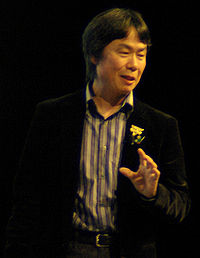Shigeru Miyamoto: Difference between revisions
No edit summary |
No edit summary |
||
| Line 15: | Line 15: | ||
}} | }} | ||
{{art-nwiki}} | {{art-nwiki}} | ||
'''Shigeru Miyamoto''' (宮本 茂, ''Miyamoto Shigeru''), born November 16, 1952, Sonobe, Kyoto) is a Japanese video game director, video game producer, concept artist, video game designer, and EAD general manager who is the creator of many [[Nintendo]] flagship franchise characters such as [[Mario]], [[Donkey Kong]], [[Link]], [[Fox McCloud]], [[Olimar]], [[Bowser]], [[K. Rool]], [[Ganondorf]], [[Andross]], [[Luigi]], [[Falco Lombardi]], [[Princess Peach]], [[Zelda]], [[Pikmin]] and other [[Nintendo]] icons. He is known by many as the father of modern gaming, and is often credited with the [[Nintendo DS]] and the Nintendo [[Wii]]. | '''Shigeru Miyamoto''' (宮本 茂, ''Miyamoto Shigeru''), born November 16, 1952, Sonobe, Kyoto) is a Japanese video game director, video game producer, concept artist, video game designer, and EAD general manager who is the creator of many [[Nintendo]] flagship franchise characters such as [[Mario]], [[Donkey Kong]], [[Link]], [[Fox McCloud]], [[Olimar]], [[Bowser]], [[K. Rool]], [[Ganondorf]], [[Andross]], [[Luigi]], [[Falco Lombardi]], [[Princess Peach]], [[Princess Zelda]], [[Pikmin]] and other [[Nintendo]] icons. He is known by many as the father of modern gaming, and is often credited with the [[Nintendo DS]] and the Nintendo [[Wii]]. | ||
Miyamoto is one of the most internationally recognized and celebrated people in the video game industry. He was even chosen by ''Time'' Magazine as one of the 100 most influential people of the year and in 1998, he was the first person to be inducted into the Academy of Interactive Arts and Sciences' Hall of Fame. | Miyamoto is one of the most internationally recognized and celebrated people in the video game industry. He was even chosen by ''Time'' Magazine as one of the 100 most influential people of the year and in 1998, he was the first person to be inducted into the Academy of Interactive Arts and Sciences' Hall of Fame. | ||
Revision as of 02:15, March 21, 2013
Shigeru Miyamoto (宮本 茂, Miyamoto Shigeru), born November 16, 1952, Sonobe, Kyoto) is a Japanese video game director, video game producer, concept artist, video game designer, and EAD general manager who is the creator of many Nintendo flagship franchise characters such as Mario, Donkey Kong, Link, Fox McCloud, Olimar, Bowser, K. Rool, Ganondorf, Andross, Luigi, Falco Lombardi, Princess Peach, Princess Zelda, Pikmin and other Nintendo icons. He is known by many as the father of modern gaming, and is often credited with the Nintendo DS and the Nintendo Wii.
Miyamoto is one of the most internationally recognized and celebrated people in the video game industry. He was even chosen by Time Magazine as one of the 100 most influential people of the year and in 1998, he was the first person to be inducted into the Academy of Interactive Arts and Sciences' Hall of Fame.
Shigeru Miyamoto has worked alongside Masahiro Sakurai throughout the Super Smash Bros. series.
History in Nintendo
Shigeru Miyamoto was one of the first Nintendo employees to invent one of the most popular video games. He created Super Mario Bros. in 1985 which was praised for saving the video game industry for the video game crash of 1983. He moved on to the Donkey Kong series and later made the Mario series, which borrowed some of the characters from Donkey Kong and is considered one of the most successful and best video game series of all times. He's also the creator of the Zelda series, the Star Fox series, the Pikmin series and the F-Zero series. Shigeru Miyamoto's Mario series was, in the past, also considered a "rival" of the Sonic the Hedgehog series until Sega dropped out of the console market.


